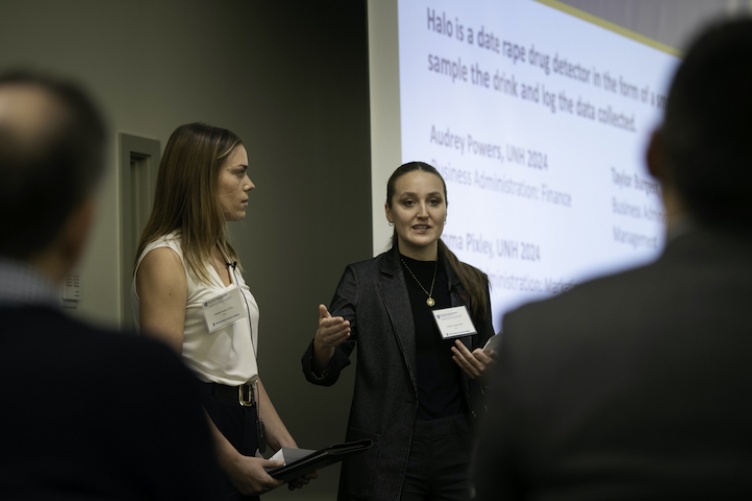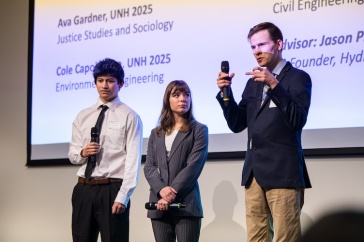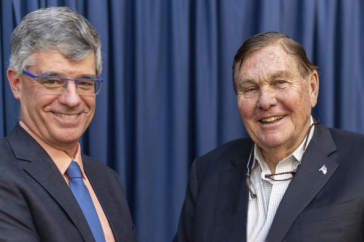
Members of team Halo present at the Social Venture Innovation Challenge on Dec. 1.
A smart ring that can detect the presence of date rape drugs in drinks, an edible supplement made from seaweed to reduce methane production in cows and a process to produce renewable jet fuel were some of the student-generated entrepreneurial ideas that took center stage at UNH’s annual NH Social Venture Innovation Challenge (SVIC) on Dec. 1.
Ten awards were doled out in a combination of judge and audience choice categories, each of which carries a cash prize, as students presented their ideas on how to solve some of the most pressing sustainability problems facing society at the state, national or global level.
NH Aquaponic Initiative, a team of four UNH engineering students – Alice House ’24, Noah Waldron ’24, Anna Gombas ’23 and James Wood ’23 – took two Judges Awards at the event in Most Impactful Story to Engage Stakeholders and Most Financially Sustainable Solution, while Team Enersave, featuring Eli Duggan ’23 and Imran Khan ‘25G, also went home with a pair of awards by securing the Most Impact Potential award from the judges and second place in the Audience Choice Awards.
“All of the finalists did UNH proud. I was blown away by the work they did on identifying meaningful topics and creating well-thought-out plans to drive social innovation,” says Harry Lamberton ’90, final round judge and president of Yellowstone Landscape. “I now understand what is meant when I hear UNH is creating a whole generation of change agents”

The SVIC – a collaborative, interdisciplinary event organized by the UNH Changemaker Collaborative and co-hosted by the Carsey School of Public Policy, the Peter T. Paul College of Business & Economics and the UNH Sustainability Institute – is a celebration of entrepreneurial and independent thinking, but many of the students in this year’s challenge were able to connect the genesis of their ideas to experiences they had in UNH classrooms.
Anthony Lotane ’25, a member of team Coweed – an aquaculture venture aiming to produce a bovine-edible supplement made from THM-rich seaweed, which will reduce methane production in cows – that took the award for Best Articulated Problem was inspired by a presentation in one of his classes from Britt Lundgren, senior director of sustainability and government affairs Stonyfield Farms.
Lundgren stressed that Stonyfield is always looking for new sustainability strategies to incorporate into its operations and noted the importance of reducing methane outputs in the dairy industry.
“I was hit with a spark of innovation,” Lotane says. “I realized there was indeed a market and a need for a new venture that was aimed toward solving this problem that Stonyfield, and many other farms, face.”
Likewise, Maddie Beaton ’24 and Audrey Powers ’24 brought a fusion of ideas from a pair of classes together to create Halo, a date rape drug detector in the form of a smart ring that can sample a drink and log the data collected. Halo earned Most Original Innovation at the SVIC.

Beaton and Powers were in an intro to marketing class where groups were asked to create a new product and outline the logistics of bringing the product to market. Powers noted that she had conceived an idea in her intro to business class, and the group “was able to take her initial idea and take it to the next level using technology,” Beaton says.
“The creativity really sparked in my group due to all of our different perspectives, which is why I believe the project worked so well,” she says. “When we heard about the SVIC challenge, we realized we had already created an idea that would be a perfect fit for the competition.”
Having a platform in the SVIC to share these ideas and earn both critical feedback and expert encouragement is a game-changer, Lotane says.
“Walking on stage and receiving the award felt surreal,” he says. “The countless hours of arduous work had paid off, and we had received the ultimate validation – knowing that Coweed has a future and it stands to make a great impact on our planet.”
See the complete list of award winners, team members and descriptions of the team ideas below:
Best Articulated Problem: Coweed ($3,000)
Coweed is an aquaculture venture which will produce a bovine-edible supplement made from THM-rich seaweed, which will reduce methane production in cows.
Anthony Lotane ’25, philosophy and Sam Croteau ’25, analytical economics. Advisor Ian Grant, executive director, ECenter.
Most Original Innovation: Halo ($3,000)
Halo is a date rape drug detector in the form of a smart ring that can sample the drink and log the data collected.
Audrey Powers ’24, business administration: finance, Emma Pixley ’24, business administration: marketing, Taylor Burgess ’24, business administration: marketing and management, Maddie Beaton ’24, business administration: international business and economics and EcoGastronomy.
Most Impact Potential: Enersave ($3,000)
Enersave utilizes smart home technologies to lower residential energy demand during peak load events, reducing emissions and saving ratepayers money.
Eli Duggan ’23, bioengineering, Imran Khan ’25G, civil engineering. Advisor Taler Bixler ’25G, civil engineering.
Most Financially Sustainable Solution: New Hampshire Aquaponic Initiative ($3,000)
The New Hampshire Aquaponic Initiative is a proposed project to implement aquaponics – the process of raising fish and organic vegetables in tandem – at the state's fish hatcheries.
Alice House ’24, environmental engineering, Noah Waldron ’24, environmental engineering, Anna Gombas ’23, civil engineering and German, James Wood ’23, environmental engineering.
Most Impactful Story to Engage Stakeholders: New Hampshire Aquaponic Initiative ($3,000)
The New Hampshire Aquaponic Initiative is a proposed project to implement aquaponics - the process of raising fish and organic vegetables in tandem - at the state's fish hatcheries.
Alice House ’24, environmental engineering, Noah Waldron ’24, environmental engineering, Anna Gombas ’23, civil engineering and German, James Wood ’23, environmental engineering.
Best First-Year Student Entry: Closed Loop ($500)
Closed Loop creates a more sustainable future for the aerospace industry by collecting carbon dioxide emissions to produce renewable jet fuel.
Brett Schultz ’26, business administration and sustainability dual major. Advisor Ian Grant, executive director, ECenter.
AUDIENCE CHOICE AWARDS
1st Place: Electric Vehicle SCOUP ($1,000)
The EV SCOUP is a reinvention of the sunshade that provides a supplementary charge to vehicles by utilizing the rays that hit it instead of reflecting them, all while keeping the vehicle cool.
Clair Carroll ’23, business administration: management and cinema and media Arts (UNH Manchester).
2nd Place: Enersave ($750)
Enersave utilizes smart home technologies to lower residential energy demand during peak load events, reducing emissions and saving ratepayers money.
Eli Duggan ’23, bioengineering, Imran Khan ’25G, civil engineering. Advisor Taler Bixler ’25G, civil engineering.
3rd Place: Halo ($500)
Halo is a date rape drug detector in the form of a smart ring that can sample the drink and log the data collected.
Audrey Powers ’24, business administration: finance, Emma Pixley ’24, business administration: marketing, Taylor Burgess ’24, business administration: marketing and management, Maddie Beaton ’24, business administration: international business and economics and EcoGastronomy.
4th Place: CRRS biofuel ($250)
CRRS biofuel is a company aimed at outsourcing oyster mushrooms to produce a more sustainable transportation fuel.
Lilah Read ’25, neuroscience and behavior, Jelena Rutter ’24, wildlife and conservation biology, Matt Corso ’25, anthropology and EcoGastronomy, Jenson Scott ’23, business administration: finance and entrepreneurial studies. Advisor Jason Plant ’23, Sustainability Fellowship.
-
Written By:
Keith Testa | UNH Marketing | keith.testa@unh.edu



















































